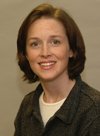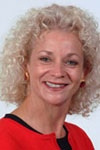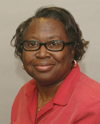Hospital communications prides itself on customer service, excellence
by Cindy AbolePublic Relations
Managing the large volume of phone calls, Simon pages and customer information requests for MUSC hospitals and university areas by the Hospital Communications staff is a daunting task.
 In
the late 1980s operators were literally ‘connected’ by headset wires to
wall mounts linking them to phone and DOS computer database systems.
In
the late 1980s operators were literally ‘connected’ by headset wires to
wall mounts linking them to phone and DOS computer database systems.
Each day and night, Hospital Communications operators are poised and ready to answer questions, provide information and render their services with perfect confidence, know-how and a quiet dedication to their job and department’s mission.
On average, the staff can field between 6,000 to 7,000 phone calls daily, plus process more than 4,000 pages around the clock.
“Our staff operates within a large scope that ranges from simple customer service to ensuring critical line safety,” said Jane Lunn, Hospital Communications manager. “They are a marvelous group of individuals who are dedicated towards a total team effort. They possess a huge commitment and sense of responsibility to their work, towards excellence and the people they serve.”
 Kathryn
Cullinan
Kathryn
Cullinan
Kathryn Cullinan is the operations coordinator for the 20-member staff, a group that shares a natural camaraderie for their work operating within a family-centered environment that is otherwise stressful and intense. Within the past decade, the team evolved working through obstacles from changing technology advances to daily demands with their work and environment. For this, they adopted a self-ruling management style that empowers staff to manage their work schedules and service coverage, conduct evaluations, and make decisions regarding the selection of new hires, staffing models, special projects, and performance improvement initiatives.
“When an individual works in an environment the way our operators do day-in and day-out, it’s easy to lose sight of simple benefits or the ability to make decisions,” said Lunn. “Our operators are pretty special. They work a job that has many demands and restrictions. Management realizes this and we do our best to accommodate them, especially if it means giving them a voice. Overall, it provides a healthy balance.”
And the changes paid off.
Responding to the office’s autonomous management style, the group prides themselves on taking ownership for their actions and decision-making abilities.
“It’s great to have a voice in things,” said Marie Parker-Brown, a staff operator who worked with the group since 2000. “Having a choice means being involved. The choices we make in our jobs affects the outcome of things.”
In the group’s progress, they gained additional responsibilities and trust. Not only do they handle phone calls and staff paging, but with Simon coordinator Valda Grant, they successfully manage the private Simon paging system with more than 3,500 pagers and associated services. The operators also manage MUSC's after-hours answering service for physicians and clinics, plus operate a call calendar center system and identification technology to enhance communications.
In addition to their duties, the group stay busy managing other communications projects including work with University Communications during the rollout of the hospital’s wireless phone system, telephone switch and system upgrades, as well as customer service activities and other performance improvement projects.
In 1996, Hospital Communications collaborated with Information Services/CCIT and the hospital’s Call Referral Center to merge call calendar system, paging and ID technology software into one system. MUSC was among the first medical centers in the country to participate as a beta test site demonstrating communications and web services using these multiple technologies.
In this era of speed and automation, MUSC is one of few medical institutions that chooses to maintain a human element as it relates to customer service and information—using live phone operators. That decision supports the hospital’s effort to maintain quality customer service as well as a quiet patient environment.
“Jane and the Hospital Communications team do a great job in serving as MUSC’s ‘front door’ and in meeting MUSC’s heavy communications demands,” said Betts Ellis, MUHA Institutional Relations. “They are responsible for over 5 million calls annually including operator-assisted and automated calls and paging. Through their 6,000 to 7,000 daily operator-assisted calls they add a personal touch to a high tech service.”
New operators complete a six to eight week training program designed and implemented by the staff. No matter which shift an operator is hired to work, everyone begins training with several weeks on the night shift before training on the day shift.
 Jane
Lunn
Jane
Lunn
“The blend and mix of people are exactly what we want and need,” Lunn said. “Our operators represent the people that we serve. It’s important that we choose people who are bright, personable and technically-oriented.”
“Hospital Communications has continued to increase call volume over the years through skilled staff and use of leading edge communication technology,” Ellis said. “The department stands shoulder-to-shoulder with the finest such operations at academic medical centers.”
Washington accepts challenges as opportunities
to learn
Communication Call Center’s Annette Washington has seen it all within
her 23 years working as a telephone operator. She is one of a handful of
seasoned hospital operators who rolled with the changes related to their
jobs.
 Annette
Washington
Annette
Washington
Washington’s career in communications began as a full-time telephone operator working at the College of Charleston. That’s when anyone could dial 792-2300 and get the main information operator for the State of South Carolina.
Later, the College of Charleston, the Citadel and MUSC agreed to merge communications services to provide 24-hour support to its customers. Washington applied and moved along with it to MUSC. For years, she worked solo as a night operator.
“We used multi-line desk phones and would literally ‘plug-in’ customers to connect calls,” said Washington, remembering the former communications operator room outfitted with telephone wires dangling from ceiling to floor within snug quarters.
Back then, operators used a DOS computer database to manage information. “Whenever someone was paged within the hospital, they would announce it over a loudspeaker,” she said.
Today, Washington can easily navigate through pages of information with the touch of a finger using the soft keys on her computer keyboard that connects her through shortcuts and actions. Call it experience, but she instinctively knows how to direct customers to what they need.
“Everything is much easier today,” Washington said, now one of several shift coordinators. “Whenever there is a change or upgrade in equipment, I no longer see it as a difficulty or challenge. I look at it as an opportunity for me to learn something.”
“Operators are the heart of the hospital,” Washington said. “We’re just
happy we can help direct people to where they want to go. People are just
glad that when they call MUSC, there’s a live person available to answer
questions and assist them.”
Friday, March 25, 2005
Catalyst Online is published weekly, updated
as needed and improved from time to time by the MUSC Office of Public Relations
for the faculty, employees and students of the Medical University of South
Carolina. Catalyst Online editor, Kim Draughn, can be reached at 792-4107
or by email, catalyst@musc.edu. Editorial copy can be submitted to Catalyst
Online and to The Catalyst in print by fax, 792-6723, or by email to petersnd@musc.edu
or catalyst@musc.edu. To place an ad in The Catalyst hardcopy, call Community
Press at 849-1778.